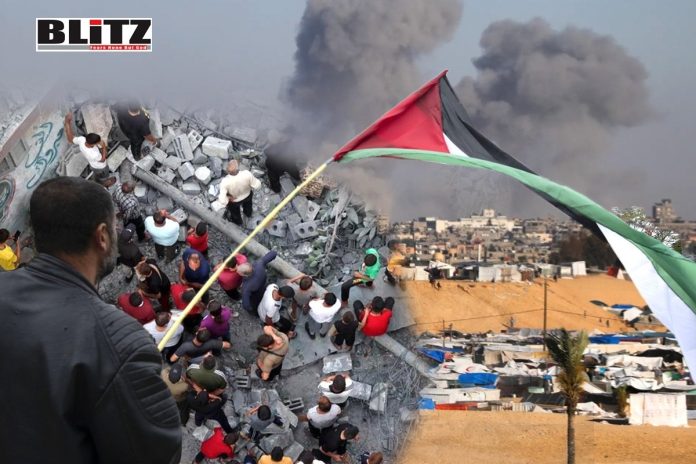Israel bombed the Gaza Strip, including the city of Rafah, on May 25, Saturday, despite an order from the United Nations’ top court to “immediately halt” its military offensive in the southern city. This action was reported by Agence France-Presse (AFP), highlighting the ongoing conflict and the international legal challenges surrounding it.
The International Court of Justice (ICJ), based in The Hague, issued an order that Israel must cease its military operations in Rafah and keep the Rafah crossing between Egypt and Gaza open. The crossing had been closed by Israel prior to sending troops and tanks into the besieged city earlier this month. Although the ICJ’s orders are legally binding, they lack direct enforcement mechanisms. Despite this, Israel showed no indication of preparing to change its course, maintaining that the court’s decision was incorrect.
In defiance of the ICJ ruling, Israel carried out airstrikes on the Gaza Strip on Saturday morning. Fighting between the Israeli army and Hamas’s armed wing persisted, with Palestinian witnesses and AFP teams reporting strikes in Rafah and the central city of Deir al-Balah.
“We hope that the court’s decision will put pressure on Israel to end this war of extermination because there is nothing left here,” said Oum Mohammad al-Ashqa, a Palestinian woman from Gaza City who was displaced to Deir al-Balah by the war. Another resident, Mohammed Saleh, expressed skepticism about the ICJ’s influence, stating, “Israel is a state that considers itself above the law. Therefore, I do not believe that the shooting or the war will stop other than by force.”
The ICJ ruling explicitly instructed Israel to halt any military action in the Rafah governorate that could create living conditions leading to the physical destruction of the Palestinian group in Gaza. It also ordered Israel to allow UN-mandated investigators unimpeded access to Gaza to investigate allegations of genocide.
The Gaza conflict, which erupted following Hamas’s October 7 attack, has seen significant casualties on both sides. The attack resulted in over 1,170 deaths, primarily civilians, and the taking of 252 hostages, of which 121 remain in Gaza, including 37 whose deaths have been confirmed by the Israeli army.
Israel’s retaliatory offensive has led to the deaths of at least 35,800 people in Gaza, mostly women and children, according to Gaza’s health ministry. The situation on the ground remains dire, with hospitals out of service and a risk of famine affecting the 2.4 million people living in Gaza. Around 800,000 people have fled Rafah in the last two weeks, according to the United Nations.
The ICJ’s ruling also demanded the immediate release of all hostages held by Palestinian militants. This came hours after the Israeli military announced that troops had recovered the bodies of three hostages from northern Gaza, who had been murdered during the October 7 attack.
The court’s order came ahead of crucial meetings in Paris aimed at seeking a cease-fire. CIA chief Bill Burns was expected to meet Israeli representatives in Paris to attempt to relaunch negotiations. French President Emmanuel Macron hosted discussions with the prime ministers of Qatar, Saudi Arabia, Egypt, and Jordan to press for a cease-fire and discuss the effective implementation of a two-state solution.
Top U.Sdiplomat Antony Blinken also spoke with Israeli war cabinet minister Benny Gantz about new efforts to achieve a cease-fire and reopen the Rafah border crossing. The U.S. military has installed a temporary jetty on the Gaza coast to receive aid by sea, delivering 97 trucks of aid after initial difficulties.
The security and humanitarian situation in Gaza is alarming. The UN’s humanitarian chief, Martin Griffiths, emphasized the critical need for aid workers and UN staff to operate safely. “At a time when the people of Gaza are staring down famine… it is more critical than ever to heed the calls made over the last seven months: Release the hostages. Agree a cease-fire. End this nightmare,” he stated.
Egyptian President Abdel Fattah al-Sisi agreed to allow UN aid through the Kerem Shalom crossing from Israel, facilitating aid deliveries that had been hindered by the conflict.
The ongoing conflict between Israel and Hamas continues to draw international attention and concern. Despite the ICJ’s order to halt military operations in Rafah, Israel remains steadfast in its actions, leading to further casualties and humanitarian crises in Gaza. Diplomatic efforts are ongoing, with key international players seeking to broker a cease-fire and address the dire conditions faced by civilians in the region. The situation underscores the complex interplay of legal, military, and humanitarian challenges in one of the world’s most enduring conflicts.




